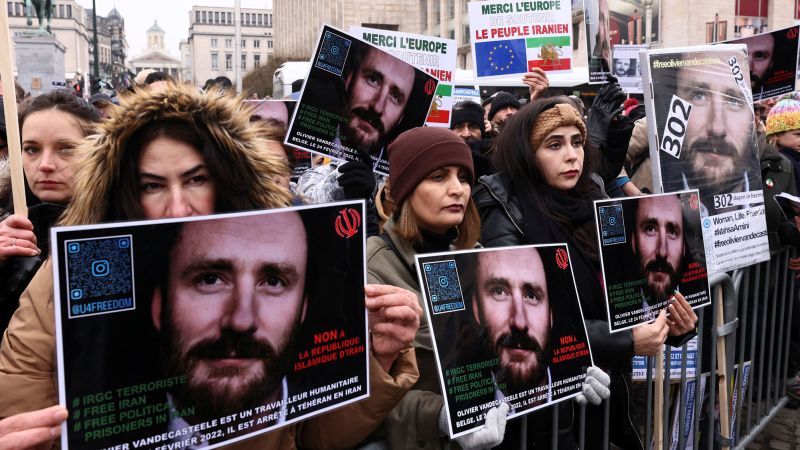The three European prisoners detained by Iran and released on Friday after mediation by Belgium landed on Saturday morning, shortly before 2:45 a.m., at Melsbroek military airport.
The three European prisoners detained by Iran and released on Friday after mediation by Belgium landed on Saturday morning, shortly before 2:45 a.m., at Melsbroek military airport, the Belga agency noted on the spot. They were welcomed by Foreign Minister Hadja Lahbib, accompanied by Danish and Austrian diplomats.
This triple release via the Sultanate of Oman was obtained – like that of Olivier Vandecasteele on May 26 – after Belgium agreed to deliver an Iranian diplomat convicted of terrorism to Tehran.
Two of the released prisoners are of dual Austrian-Iranian nationality. They had been “unjustly detained”, respectively since January 2016 and January 2019, according to Prime Minister Alexander De Croo’s explanations on Friday.
The Austrian government said they were businessman Kamran Ghaderi, arrested in January 2016 and sentenced to 10 years in prison for espionage, and 76-year-old Massoud Mossaheb, arrested in January 2019 and also sentenced to 10 years in prison in 2020 for espionage.
Suffering, this septuagenarian got out of the plane in Melsbroek leaning on crutches. He spent nearly four years in detention before being released in November 2022 on medical grounds. However, he was prohibited from leaving Iran.
The third ex-hostage is Danish. He was arrested by Iran in November 2022 on the sidelines of rallies for women’s rights. Copenhagen has not released information about his identity.
Belgium organized their evacuation via the Sultanate of Oman, from where, after passing the usual medical examinations, they were taken to Melsbroek in a medical plane.
Upon their arrival on Belgian soil, they were welcomed by the Minister of Foreign Affairs. “I told my Iranian counterpart Hossein Amir-Abdollahian of our satisfaction with the implementation of the agreement reached. Belgium will continue to work for the release of arbitrarily detained prisoners. Respect for fundamental rights and freedoms is our priority,” she tweeted earlier Friday evening.
And a few hours earlier, the head of diplomacy had called the Omani Minister of Foreign Affairs to express her gratitude. “The Sultanate of Oman has played a valuable role in the liberation of our European citizens,” she commented, also on Twitter, announcing a bilateral meeting there next week.
A First
The sultanate, unanimously thanked by Brussels, Copenhagen and Vienna, had already acted as a facilitator and transit country on May 26 during the exchange between the humanitarian Vandecasteele and Assadollah Assadi, an Iranian diplomat sentenced in Belgium for terrorism returned to his country.
“According to our information, this is the first time that a member state of the European Union has released nationals of other member states from Iran,” Belgian government sources said on Friday, welcoming the release.
This release is the second surprise part of Operation Blackstone, “directly linked” to that of Belgian humanitarian worker Olivier Vandecasteele last Friday against the Iranian diplomat convicted of terrorism Assadollah Assadi. The operation is now over, “although we will continue to engage in an international context to free other Europeans”.
After the four releases in the past seven days, 22 European Union nationals are still languishing in prisons in Iran, which has practiced hostage diplomacy for decades.
This article is originally published on lesoir.be









